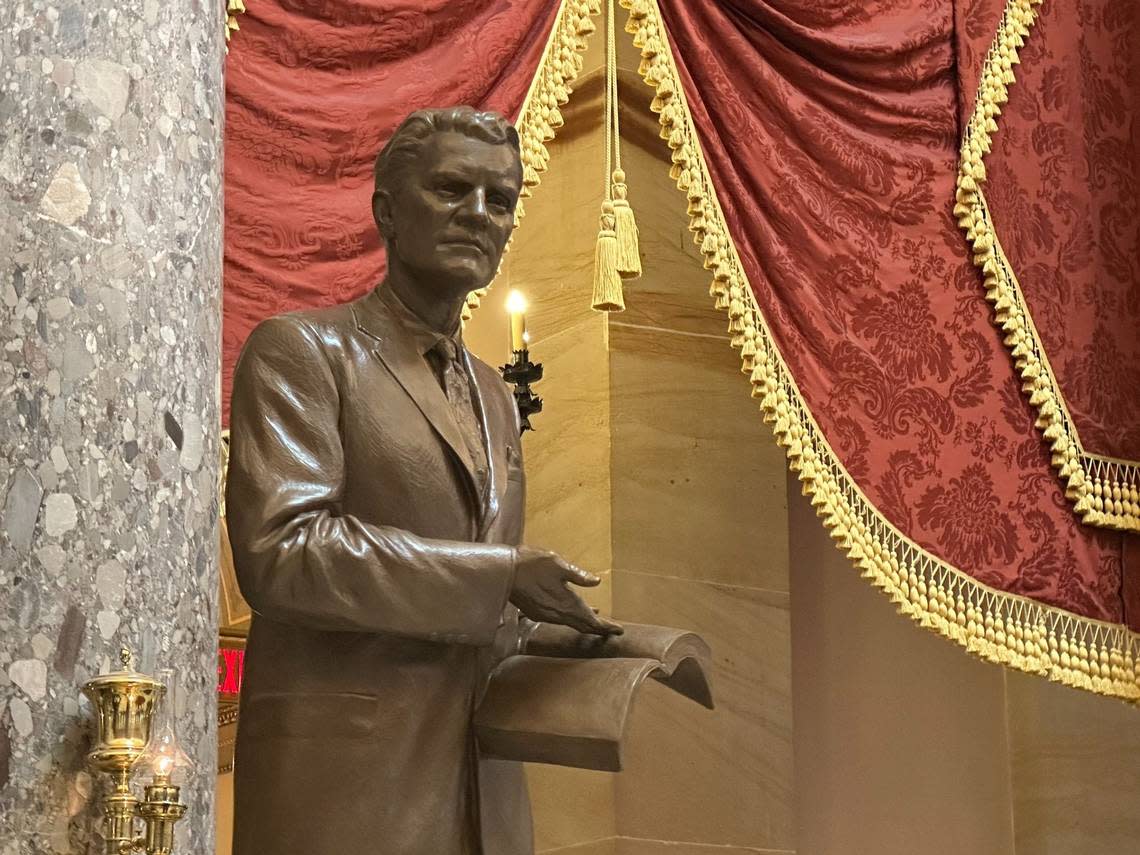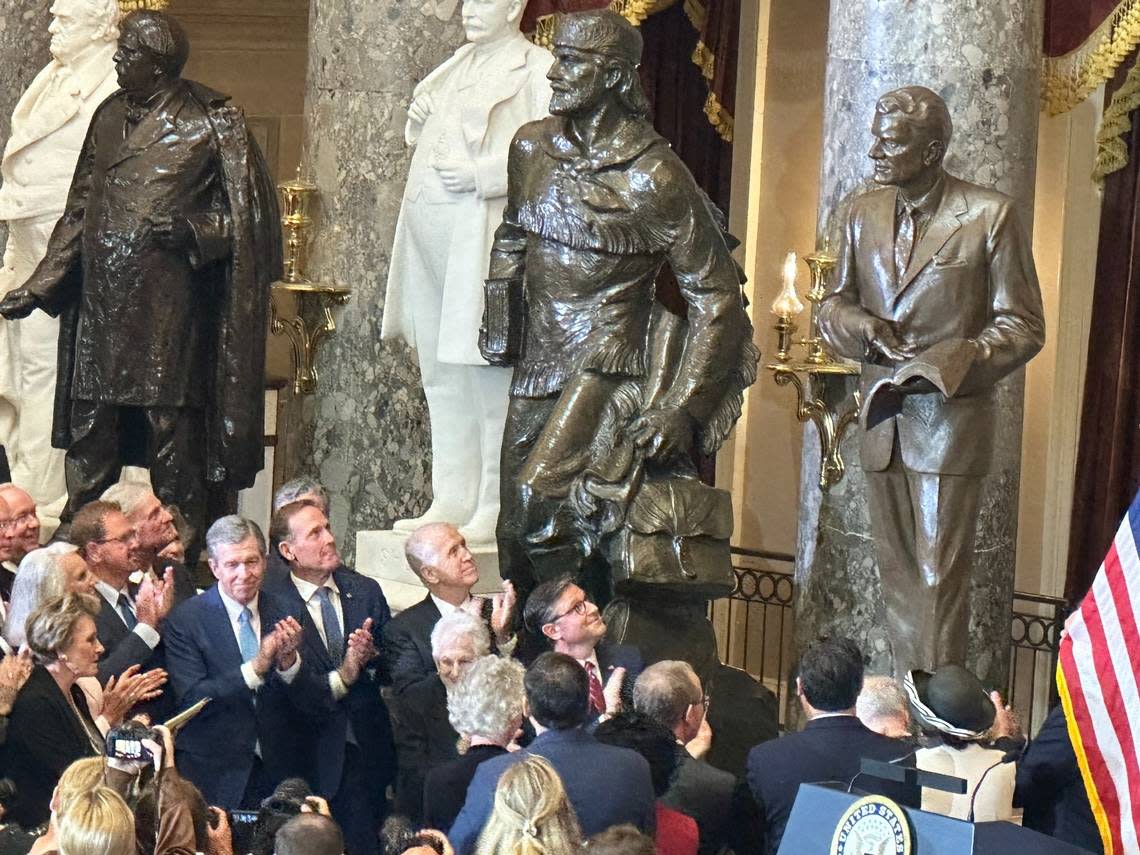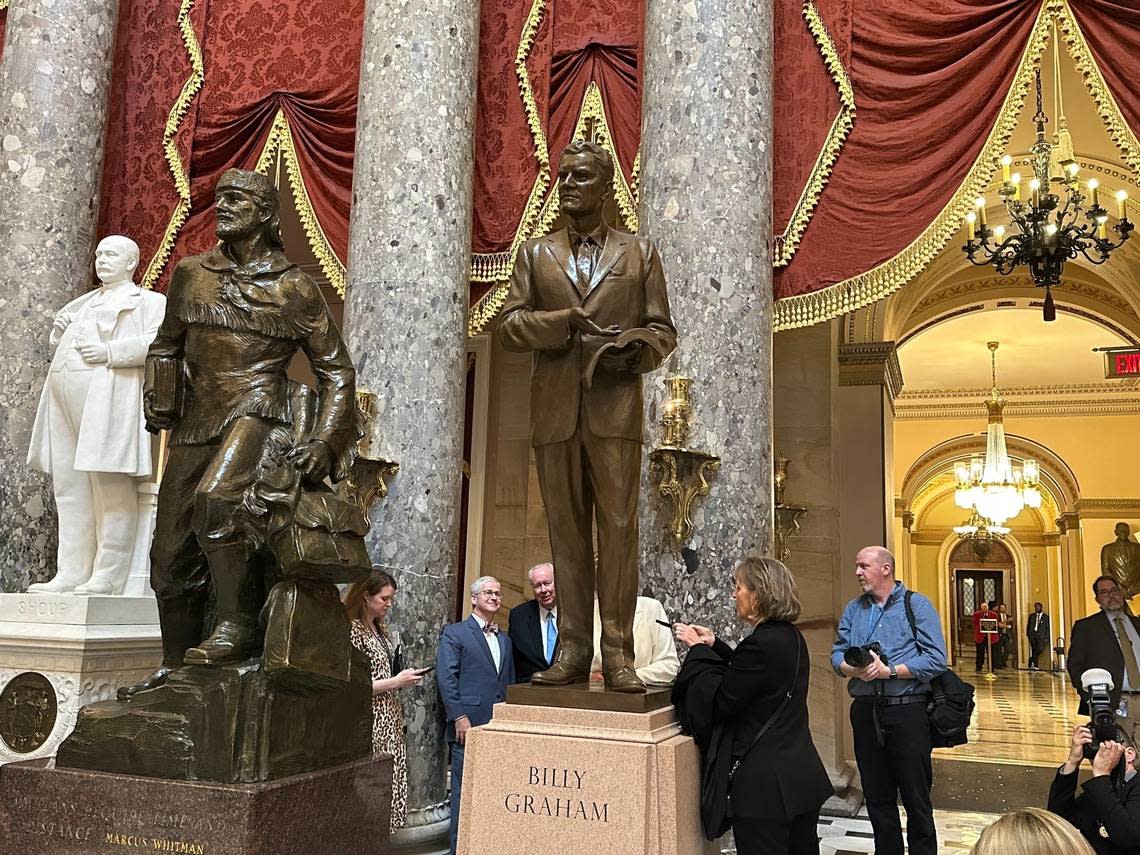Statue of Rev. Billy Graham, who ‘transcended politics,’ now stands in US Capitol
The Rev. Billy Graham now has a permanent home in the U.S. Capitol.
After a decade of trying, North Carolina’s lawmakers were able to add a statue of Graham to The Statuary Hall Collection.
“Today, North Carolina gives to our nation a symbol representing one of our dearest treasures, the Rev. Billy Graham,” said Gov. Roy Cooper, in a ceremony at the Capitol on Thursday. “A man of faith, a man of North Carolina. The Rev. Graham was known as a minister to millions, a pastor to presidents, a selfless man of God who lived out his calling by preaching and teaching across the world.”
Cooper, a Democrat, added that no matter where Graham’s ministry took him, he always returned to his home in the Blue Ridge mountains of North Carolina for rest, before returning to his mission field.
Graham was born and raised in Charlotte, and raised his family in Montreat, where he died, at 99, in 2018. He spent his adult life traveling the world preaching the Gospel to anyone who would listen.
Cooper said he was one of 200 million people who heard Graham speak in person, when Cooper was a child and Graham came to Carter-Finley Stadium in Raleigh.
North Carolina Sens. Ted Budd and Thom Tillis, both Republicans, said they were among the two billion who heard Graham speak through broadcasts.
“I hope when members of Congress walk by his statue, they reflect on the standards of faith, ethics and decency that he exemplified throughout his extraordinary life,” Tillis said. “I believe that his presence here in the Capitol can help us find opportunities to unite around what makes our nation great.”
He added that there’s no North Carolinian more deserving.

Replacing Aycock
Earlier in the program, Cooper told the audience that Graham’s statue will replace one that “brought painful memories of racism.”
North Carolina is allowed two statues in the Statuary Hall Collection representing someone deceased from the state. Graham replaces Charles Aycock, who served as North Carolina’s 50th governor beginning in 1901. But Aycock garnered power by stifling the Black vote, and his push for white supremacy is blamed for causing the Wilmington Massacre, an insurrection that killed dozens of Black people and overthrew the Wilmington government, which included both Black and white members.
After reading a book about Aycock’s history of racism, Rep. Patrick McHenry, a Republican from Lincoln County, called for his removal from The Statuary Hall Collection and helped decide on Graham as a replacement.
McHenry said during the ceremony that his greatest moment as a congressman came in 2012, when Graham’s staff asked for McHenry to meet with him. McHenry is chairman of the House Financial Services Committee and was the first member of Congress in U.S. history to lead the House after it voted out its speaker.
“To be able to speak with Rev. Graham in the home where he and Ruth raised their amazing family, to pray with him, to feel the warmth that so many felt, broadly and one-on-one, is a memory I will always treasure,” McHenry said, before talking about Graham’s legacy and how he “transcended politics.”

The ceremony
The statue’s unveiling brought many of North Carolina’s leaders together Thursday, including Cooper, Lt. Gov. Mark Robinson, Senate leader Phil Berger, House Speaker Tim Moore, Chief Justice Paul Newby and all but four members of North Carolina’s delegation.
Former Vice President Mike Pence also attended.
The ceremony was steeped in Christian messages, hymns and a performance by three-time Grammy winner Michael W. Smith.
It was led by House Speaker Mike Johnson, who shared his excitement that he was holding Graham’s Bible, which included his handwritten notes inside.
A black cloth shrouded the statue until the lawmakers gathered together to unveil the 7-foot work sculpted by Chas Fagan, of Charlotte.
Republicans and Democrats stood together. They shook hands, talked and even gave an occasional hug to one another, encapsulating the message Cooper said Graham was known for.
“He did not seek to bludgeon or demonize any political candidate or party,” Cooper said. “Instead he used his magnetic, loving and persuasive gifts to council and lift in prayer the political views of both parties.
Backlash from some Christians
Not everyone was as thrilled about Graham, or his family’s presence, in the Capitol.
Outside, Faithful America, a grassroots organization of Christians advocating for social justice, sent a mobile billboard to draw attention to Franklin Graham. Franklin Graham is one of the evangelist’s five children and is an ardent supporter of former President Donald Trump and an outspoken opponent of LGBTQ rights.
He spoke during the ceremony, saying that his father would be uncomfortable with the attention, believing the focus should remain on God.
“For several years, Faithful America has called out Franklin Graham’s anti-democratic and hate-fueled discriminatory rhetoric, as well as his support for various far-right conspiracy theories,” a news release from Faithful America said. “The organization previously named Graham to their list of Christian nationalist False Prophets, calling him ‘the nation’s most insidious Christian nationalist.’”
Americans United for Separation of Church and State President and CEO Rachel Laser spoke out against the statue itself, calling Graham exclusionary and divisive.
“Recognition in the U.S. Capitol’s Statuary Hall is a unique honor that should be reserved for those who most purely embody our American ideals of freedom and equality for all,” Laser said. “The late Rev. Billy Graham — with his history of advancing Christian Nationalism, making antisemitic statements, crusading against LGBTQ+ equality and a less-than-stellar record on civil rights for Black Americans — does not deserve this honor.”

Graham’s legacy
Inside Statuary Hall, Cooper acknowledged that Graham was not perfect.
“He would have been the first to acknowledge that,” Cooper told his audience. “Instead, he realized that he and all of us here today have feet of clay, we are imperfect. We have been found wanting, but he believed, as many of us do, that there is redemption and he gave his life to delivering that message.”
Rep. Virginia Foxx, a Republican from Banner Elk, who is typically known for her harder demeanor, became emotional while she spoke of Graham’s legacy.
She said that statues in the Capitol should represent the very best of America. Her voice cracked as she explained how many people Graham brought to faith.
“That is why it is such a proud moment for me and North Carolinians to see Rev. Graham’s statue take its place here,” Foxx said.
